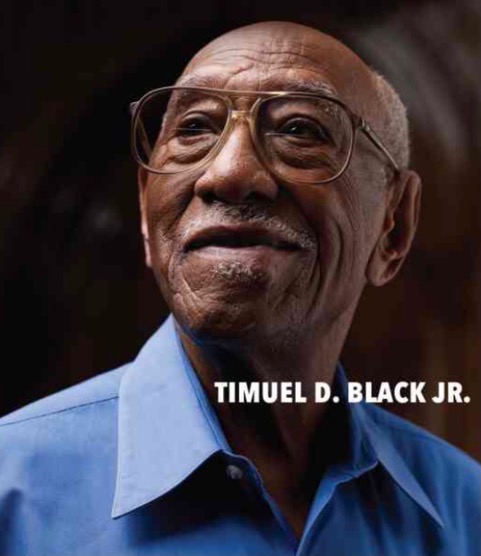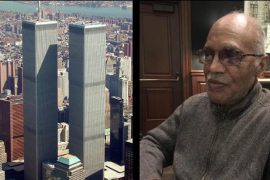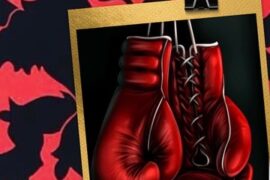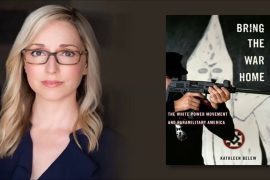Tim was the Consummate Activist.
The city mourns the passing of Timuel Black Jr. at the age of 102 years. In his own words, “I lived a happy life, productive for myself as well as for others.” Simple words express a great life.
Tim came to Chicago as an infant in 1919. His family was part of the Great Black Migration. His family came from Alabama, where his grandparents were sharecroppers, and as was the case for so many, his family left southern soil for a better northern life. A little-known fact, Tim’s family was owned by the family of Supreme Court Justice Hugo Black. Black served on the bench from 1937 to 1971. Tim found out about his family tree when he and friends were about to protest the appointment of Black. His father told him that Black was okay and that there was a family relationship. He promised Tim that things would be just fine.
I’m Every Man…
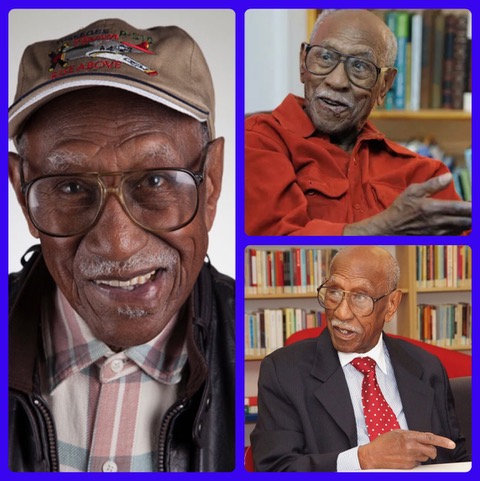
Chaka Khan recorded the song, “I’m Every Woman,” The title could be easily applied to describe Tim’s life, “He was Every Man.” You name it, and Tim did it. He was a dedicated, committed Black man who lived on the Southside of Chicago. While a young man in the Army, he had an experience that shaped his life. As a soldier in World War II, he witnessed the absolute horror and inhumane treatment in the Buchenwald Concentration Camp. His life works developed from the experience.
Tim, my mother, and my uncle were classmates at DuSable High School. At the time of their attendance, there were just a few Black high schools in the city. However, DuSable was the school for many high Black achievers. Tim tells the story that Nat King Cole was his classmate, and they sat next to each other. My mother recalled Dorothy Donegan as her classmate. Harold Washington also attended school with them. Tim went back to his alma mater to teach history, along with Dr. Margaret Burroughs.
Tim went on to The University of Chicago to earn his Master’s Degree, and was one of the first Black professors to teach at the City Colleges of Chicago. He taught sociology and anthropology and he was also an administrator. His final teaching years were at Loop College, which became Harold Washington College.
At all times, Tim was a teacher and historian and could recall history at the drop of a hat. He was a quiet gem but carried a big stick indeed. Always available to organize and willing to join a committee that was moving forth positively. He was always available to listen to an idea, with good advice on how you might proceed. He became the community griot. So many checked facts with him about people, events, and happenings. He was always available for such conversations.
When I became an administrator at City Colleges, he was a mentor. During the Harold Washington campaign, Tim challenged Dr. Wayne Watson and me. The challenge was to add a table at the end of the college registration process; the final table would be to register to vote. We were hesitant to do this because we thought it would be interpreted as “political.” Tim insisted, and with daily phone calls, he emphasized it was not “political” but civic. He was right, and we added the final table at all of the schools. It rendered 100,000 new voters.
The Conversation…
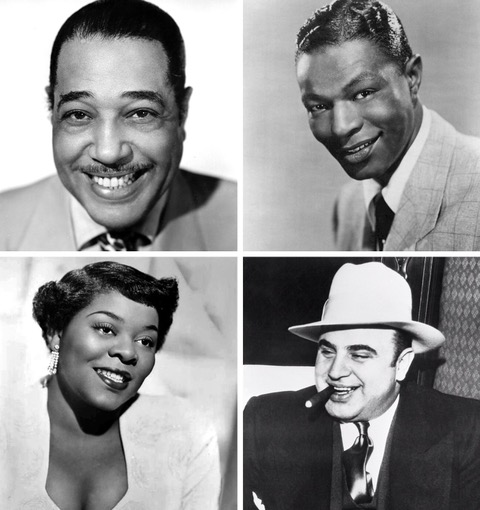
Another time Tim visited my home to talk to my mother. He included my family in his book, and he wanted to interview her. It was one of the most dynamic conversations I have heard. I was listening to the folk Tom Brokaw called, The Greatest Generation. They had a lot in common. Their conversation went from being students at DuSable High School and their classmates to World War II, President Roosevelt, and ‘Bronzeville‘ was a newly made-up name. The Black community was referred to as “The Black Belt.”
They talked about all of the businesses that existed in their heydays like The Regal Theater, The Pershing, The Savoy, Club De Lisa, The Rhumboggie, The Beige Room, and The Grand Terrace. They talked about the good old days and who came to places, like Duke Ellington, Billie Holiday, Dinah Washington, Nat King Cole, Johnny Hartman, and The Count Basie Band. They talked about Roberts Show Lounge. They remembered Joe Louis‘s boxing matches and the lavish parties after he won the fight. And then they talked about Jackie Robinson and how seriously they went to the ballpark to watch Jackie hit that ball. They were reminiscent as I was a witness to a first-hand oral history. Tim told me beautiful stories about my father as he pioneered Pepsi Cola.
And then the conversation took a turn. They started talking about Al Capone. They remembered him being respectful of the Black communities and opening up bars and that he just wanted to sell liquor but that he was an okay guy. He hired Blacks and treated the black community as a “market.” And then they talked about the Jones Brothers and how they were very supportive of the Black community, in loaning money to Black businesses, functioning very much like a bank. They talked about the “policy” game and how it enriched the Black community, and how it was the base for what we know today as the lottery.
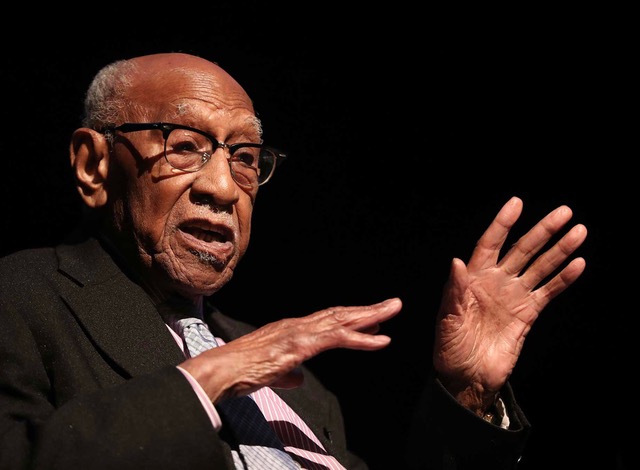
They were having a good time and an hour’s conversation turned into half the night. I listened to them as I cooked dinner, served dinner, and then we had cocktails. The stories were coming full throttle. They talked about generational differences, and Tim wanted to write his book to record prominent families of his era who helped establish the south side of Chicago. They both recalled John Johnson in school as the school newspaper editor, and they remembered when he started Black Digest, Jet, and Ebony Magazines.
One of my best recollections of Tim was working with him when Jesse Jackson brought Nelson Mandella to Chicago. The crowds were massive. We had a rally for Mandella at PUSH, and I wanted to talk to him privately; we had a private party with Mandella, and Tim told me to ask him your questions as he pushed me forward. It was a historic moment.
Tim was always on hand for the main event in the Black community. He knew Paul Roberson; he remembers when Carter Woodson was boosting the idea of Black History Week at the Wabash YMCA, which eventually led to Black History Month. I visited Tim at his home office once, and we talked about his involvement with A. Phillip Randolph. He was the chief organizer for Dr. Martin Luther King, Jr. for his March on Washington, organizing Chicago folk. He was showing me papers and letters on a wreck of a desk. He knew where every piece of paper was. He worked with Rev. Jesse Jackson, Bill Barry, Vernon Jarrett, Lu Palmer, and John Sengstacke.
When I started N’DIGO (the weekly newspaper), I brainstormed with Tim. When I began the N’DIGO GALA, he was very supportive and encouraging and never missed a gala, all 20 of them. He liked the idea very much that scholarships were provided. He was always the first to buy his ticket, and he lost his tickets annually, and I always took them to him the night before the gala.
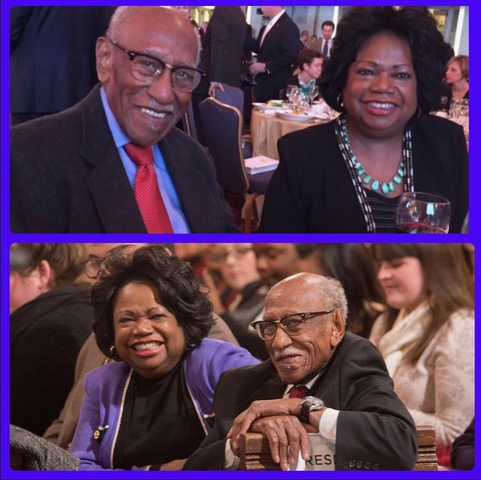
If you knew Tim, you knew his love and romance with his wife, Zenobia. They were married 40 years, and the honeymoon didn’t end. He would light up talking about her.
He was wonderful. We now have to learn to live without him because he has always been present, for a checked fact, a story about somebody, a recollection; he always told it straight. He lived a wonderfully productive life. He was dedicated to the Black community at every level. He taught us, supported us, and was ready for a good party, a good fight, a good book, and good jazz.
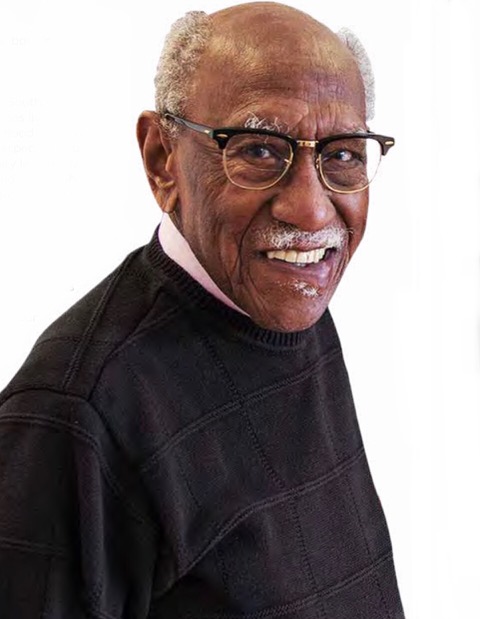
Timuel Black made Chicago a better place. He made the Black community stronger. And if you knew him, you were blessed. He lived a great long life. He was the master of much. He wasn’t sick; he was healthy; he died a natural death. And by the way, he never got old. He was always current. He was a treasure. As he went into hospice at the end of his life, Chicago came to his care in a Go-Fund-Me Page that raised over $100,000. That’s was the way it was supposed to be.
We were blessed to know him and are thankful that he has been among us for so long. Much love, Professor Black.
Thank you Timuel Dixon Black Jr., you lived well.
A private service will be held at First Unitarian Church and a public memorial service will be held for Timuel Black on Sunday, December 5, at Rockefeller Chapel on the campus of The University of Chicago.


